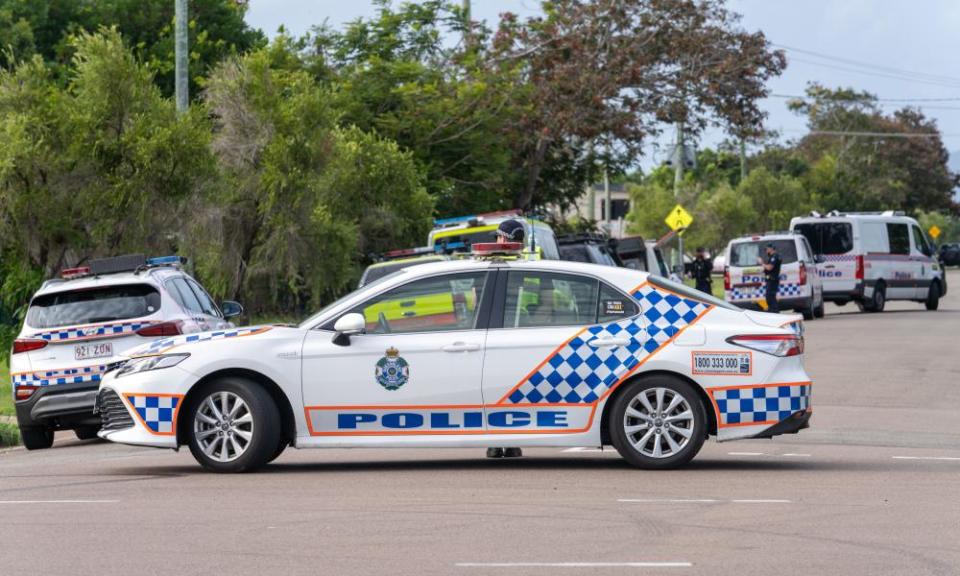‘Racist’: coercive control laws could harm Indigenous women in Queensland, advocates warn

The terms of reference for the Queensland women’s safety and justice taskforce – which is looking at laws to ban coercive control – are “explicitly racist” and ignore the experiences of First Nations women, academics and advocates say.
The state taskforce headed by the former court of appeal president Margaret McMurdo is the centrepiece of government efforts to tackle the continued escalation of domestic violence.
But a joint statement by prisoner advocacy group Sisters Inside and the Institute for Collaborative Race Research raises concerns that the remit of the taskforce is focused on further empowering a criminal justice system that is already failing women, particularly Indigenous women.
Related: From apologetic to hardline: Queensland and Northern Territory’s backflip on tackling youth crime
The statement highlights how in the terms of reference for the taskforce, the only mention of Aboriginal and Torres Strait Islander women is to consider them as “both victims and offenders”.
“Their own terms are explicitly racist,” says Chelsea Watego, a Munanjahli and South Sea Islander woman and academic.
“I’m actually shocked how explicitly the taskforce sets up the terms to exclude Indigenous women. The only time we’re named is to remind people we’re a potential offender.”
In 2017, almost half the women murdered by an intimate partner in Queensland were previously identified by police as the perpetrator of domestic violence. Aboriginal and Torres Strait Islander women are more frequently misidentified as domestic violence offenders – some service providers have estimated they are labelled the perpetrator by police in 90% of cases.
Many women’s organisations – including some Indigenous groups and advocates – support the primary aim of the taskforce, which is the criminalisation of coercive control. They point to success of similar laws in places like Scotland, and say criminalisation could ensure authorities considered patterns of abuse, rather than taking a siloed approach to individual domestic and family violence incidents.
Others say that while coercive control is a serious problem, the extent to which domestic violence victims are misidentified as perpetrators – and the extent to which Indigenous women are criminalised – highlights how women could in turn be targeted by laws conceived to protect them.
“It will be up to the police to determine the truth of coercive practices,” the submission says. “This is a major expansion of police discretion.
“The threat of such a vague offence will further deter at-risk women from engaging with police in domestic violence situations and will subject them to the very forms of subtle control that this legislation ostensibly seeks to avoid.”
The submission also highlights how proposals to criminalise coercive control have stripped the term of its “gendered dimension” and “hide the fact that it is a practice of control exercised in conditions of patriarchal power”.
“By failing to name the most powerful form of domination in the criminal legal space – the hyper-incarceration of Aboriginal women – the [terms of reference] position these women as potential perpetrators and propose new legal instruments that can and will be used to further criminalise them.
“Coercive control legislation thus becomes a mechanism to further structurally disempower Indigenous women, making them more rather than less vulnerable to subtler forms of control.
Related: ‘A very broken system’: why are Queensland police still getting domestic violence cases so wrong?
“The imagined victim and beneficiary of media discussions of coercive control is a white straight middle-class suburban woman. It is for this woman’s protection that the state has initiated the current process.”
Watego said the taskforce specifically identified the Queensland Police Union as an advocacy group to participate in consultation, but did not name any Indigenous groups.
“When you foreground the experiences of Indigenous women, you get a solution that works better for everybody, not just for Indigenous women,” Watego said.
“But instead it’s the same story. There’s a pattern here with each time the [Queensland government] has a review and a taskforce, they always come to the conclusion of more powers for the state.
“It’s us as Indigenous women who get brutalised by it.”
The attorney general Shannon Fentiman said the terms of reference were formulated after extensive consultation with stakeholders, including with Sisters Inside.
“The taskforce has met with Sisters Inside and will be working with all sections of our diverse Queensland community to make sure that the recommendations are informed by the results of its consultation and engagement,” Fentiman said.
“It’s great to see diversity in the membership of the taskforce and they will be looking closely at barriers faced by First Nations people, those from culturally and linguistically diverse backgrounds, the LGBTI+ community and those with disability.
“The terms of reference were drafted to allow all Queenslanders to have their voice heard in this crucial review and I would encourage anyone wanting to share their experience to make a submission online.”

 Yahoo Finance
Yahoo Finance 